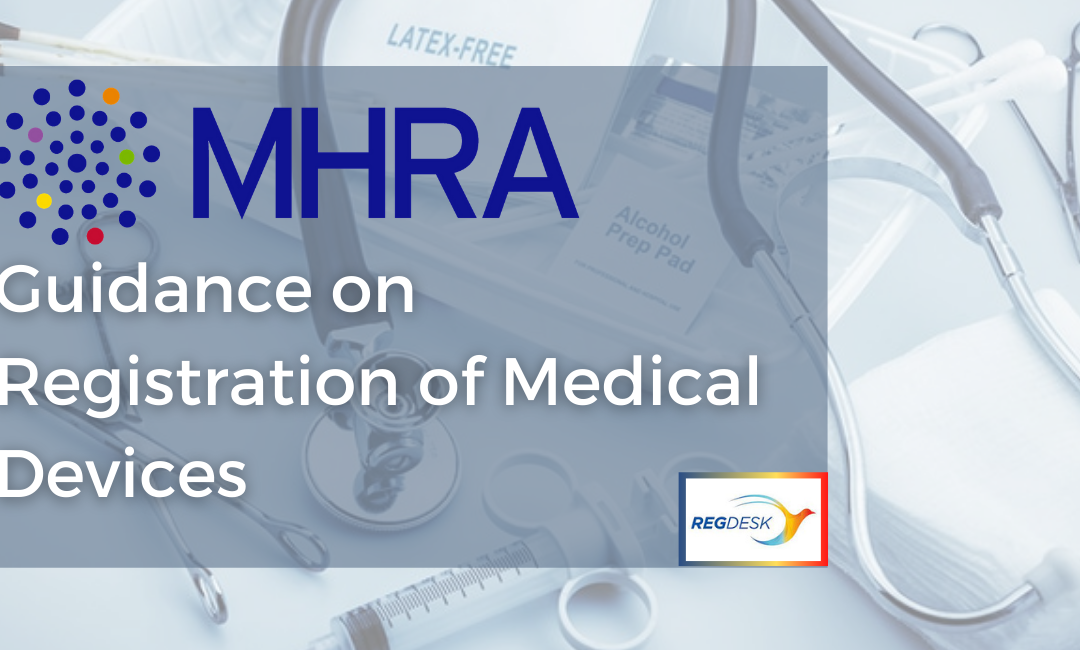The Medicines and Healthcare products Regulatory Agency (MHRA), the UK regulating authority in the sphere of medical devices, has published guidance describing the registration process medical devices must go through before placing them on the market in Great Britain and Northern Ireland. The present document constitutes an updated version of the guidance initially published by the MHRA earlier in December 2020.

The scope of the guidance covers the following main points:
- Situations when registration is required,
- Registration timelines,
- Information to be submitted to the authority,
- Specific aspects related to in vitro diagnostic medical devices,
- Device Online Registration System (DORS),
- Applicable fees,
- Amendments to the registry entries
Table of Contents
Regulatory Background
According to the applicable legislation, registration is required for:
- Class I medical devices,
- In Vitro Diagnostic medical devices,
- Custom-made devices,
- Systems and procedure packs.
In the case of medical devices of other types, additional grace periods could be applied.
The authority also states that medical devices intended to be marketed and used in Great Britain should comply with the regulatory requirements set forth by the Medical Devices Regulations 2002 (UK MDR 2002) in order to be eligible for registration. For medical devices intended to be placed on the market in Northern Ireland, the regulatory requirements could be different.
Moreover, the MHRA emphasizes that applications for registration of medical devices should be submitted either by local manufacturers or by UK Responsible Persons (in the case of foreign manufacturers) or Authorized Representatives (for Northern Ireland). The applicant remains solely responsible for the accuracy and reliability of the information submitted. The regulating authority also reserves the right to require the applicant to provide additional technical documentation and information deemed reasonably necessary to demonstrate that the medical device in question complies with the applicable regulatory requirements set forth by the UK MDR 2002.

Medical Devices` Registration in Detail
In accordance with the applicable legislation, a medical device manufacturer or its authorized representative shall duly notify the regulating authority before making its product available to healthcare professionals and patients in the UK. This requirement applies to both new and refurbished medical devices of all classes, as well as system or procedure packs and custom-made medical devices.
Foreign medical device manufacturers shall, as the very first step, appoint a UK-based authorized representative – a UK Responsible Person to represent the manufacturer in all regulatory procedures associated with medical devices placed on the market. Upon appointment, the manufacturer shall communicate the details of a UK Responsible Person to the regulating authority.
At the same time, medical device distributors and supplies are not obliged to apply for the registration.
An importer could be appointed as a UK Responsible Person. Otherwise, the appointment of a separate UK Responsible Person will be required.
As mentioned, a grace period applies for the regulatory requirements described herein. The interested party may proceed with registration prior to the dates indicated by the MHRA, but it is not required to do so.
Depending on the types of medical devices, the following registration timelines should be applied:
1. May 1, 2021 – for Class IIb implantable, Class III, active implantable medical devices, and IVD List A products;
2. September 1, 2021 – Class IIa, Class IIb non-implantable medical devices, IVD List B products, and self-test IVDs;
3. January 1, 2022 – Class I, custom-made medical devices, as well as general IVDs and systems and procedure packs.
Thus, the registration timelines to be applied depend on the class of the medical device in question under the risk-based classification. Should the medical device manufacturer fail to register its products within the timelines described above, it would no longer be allowed to market such products in Great Britain.

Information to be Provided
The document also describes the particular information to be submitted by the interested party applying for the registration of a medical device in Great Britain. According to the present MHRA guidance, the applicant shall submit:
1. General information about the medical device manufacturer, including the name and address of the legal entity, details of contact persons, and also the letter of designation of a UK Responsible Person.
2. Information about the medical device subject to registration, including the indication of the class of the medical device and references to the applicable legislation, the Global Medical Devices Nomenclature (GMDN) code, name and reference number of the medical device, UDI-ID, and Basic UDI-DI (when applicable), the name of the UK Approved Body or EU Notified Body (when necessary), as well as additional indications (e.g. sterility).
3. A copy of any conformity assessment certificates or self-certification conformity declarations.
With regard to custom-made medical devices and regulatory requirements applicable thereto, the present document refers to a separate MHRA guidance on custom-made medical devices. The authority also mentions that in the case of a custom-made active implantable medical device, the applicant is also required to submit a copy of the instructions for use and labeling sample.
Marketing in Northern Ireland: Specifics
The present MHRA guidance also describes specific aspects associated with placing medical devices on the market in Northern Ireland. If the foreign manufacturer does not have a duly appointed authorized representative in Northern Ireland, the appointment of a UK Responsible Person will be required. However, this requirement could be waived in the case of placing a Class I medical device, custom-made medical device, or general IVD on the Northern Ireland market. It is also important to mention that medical device manufacturers based in Great Britain shall appoint an EU-based authorized representative to be allowed to market their products in Northern Ireland. If an Authorised Representative based in Northern Ireland has been appointed, it shall be responsible for the registration of medical devices. The MHRA additionally states that medical devices allowed to be marketed in Northern Ireland could also be marketed in Great Britain without additional registration. This approach reduces the regulatory burden on medical device manufacturers and expands the availability of medical devices.
Additional Aspects
Apart from the main points described above, the present MHRA guidance highlights certain important aspects to be considered by medical device manufacturers and other parties involved in registering medical devices with the MHRA .
For instance, the authority states that the grace period should not be applied in the case of in vitro diagnostic medical devices subject to performance evaluation studies – such products should be registered before commencing the study. However, in the case of ongoing studies, the grace period based on the risk class of the product in question could still be applied.
In order to apply for the registration of a medical device in Great Britain, an applicant shall create an account on the Device Online Registration System (DORS) operated by the MHRA. Upon successful creation of an account, which the authority will confirm via email, the applicant will be able to submit the information about the medical device subject to registration in accordance with the scope described above. The MHRA will review the request and notify the applicant of successful registration.
In summary, the present MHRA guidance describes the way medical devices should be registered in order to be allowed for marketing and use in the UK. The document pays special attention to specific features of the regulatory approaches for medical device registration in Great Britain and Northern Ireland.
Sources:
https://www.gov.uk/guidance/register-medical-devices-to-place-on-the-market
How Can RegDesk Help?
RegDesk is a next-generation web-based software for medical device and IVD companies. Our cutting-edge platform uses machine learning to provide regulatory intelligence, application preparation, submission, and approvals management globally. Our clients also have access to our network of over 4000 compliance experts worldwide to obtain verification on critical questions. Applications that normally take 6 months to prepare can now be prepared within 6 days using RegDesk Dash(TM). Global expansion has never been this simple.

